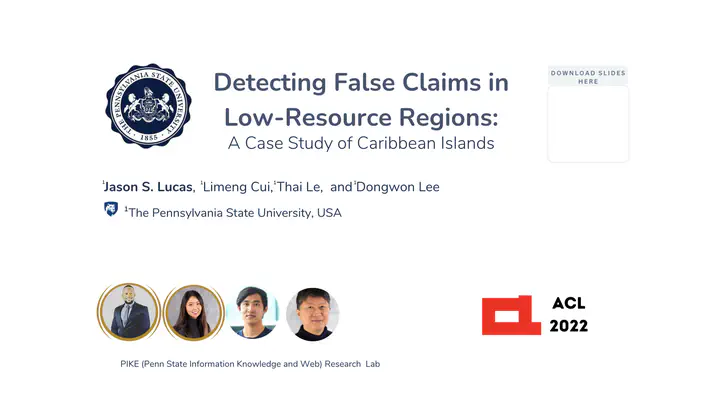Detecting False Claims in Low-Resource Regions: A Case Study of Caribbean Islands
Jason Lucas, Limeng Cui, Thai Lee, Dongwon Lee
May, 2022
Abstract
The COVID-19 pandemic has created threats to global health control. Misinformation circulated on social media and news outlets has undermined public trust towards Government and health agencies. This problem is further exacerbated in developing countries or low-resource regions, where the news is not equipped with abundant English fact-checking information. In this paper, we make the first attempt to detect COVID-19 misinformation (in English, Spanish, and Haitian French) populated in the Caribbean regions, using the fact-checked claims in the US (in English). We started by collecting a dataset of Caribbean real & fake claims. Then we trained several classification and language models on COVID-19 in the high-resource language regions and transferred the knowledge to the Caribbean claim dataset. The experimental results of this paper reveal the limitations of current fake claim detection in low-resource regions and encourage further research on multi-lingual detection.
Publication
In Association for Computational Linguistics Proceedings of the Workshop on Combating Online Hostile Posts in Regional Languages during Emergency Situations, 2022 Dublin, Ireland.
Click the Cite button above to demo the feature to enable visitors to import publication metadata into their reference management software.
Create your slides in Markdown - click the Slides button to check out the example.
Add the publication’s full text or supplementary notes here. You can use rich formatting such as including code, math, and images.

Ph.D. Student in Informatics
My research interests include low-resource multilingual NLP, linguistics, adversarial machine learning and mis/disinformation generation/detection. My Ph.D. thesis is in the area of applying artificial intelligence for cybersecurity and social good, with a focus on low-resource multilingual natural language processing. More specifically, I develop NLP techniques to promote cybersecurity, combat mis/disinformation, and enable AI accessibility for non-English languages and underserved populations. This involves creating novel models and techniques for tasks like multilingual and crosslingual text classification, machine translation, text generation, and adversarial attacks in limited training data settings. My goal is to democratize state-of-the-art AI capabilities by extending them beyond high-resource languages like English into the long tail of lower-resourced languages worldwide. By innovating robust learning approaches from scarce linguistic data, this research aims to open promising directions where AI can have dual benefits strengthening security, integrity and social welfare across diverse global locales.
 Image credit: Jason Lucas
Image credit: Jason Lucas